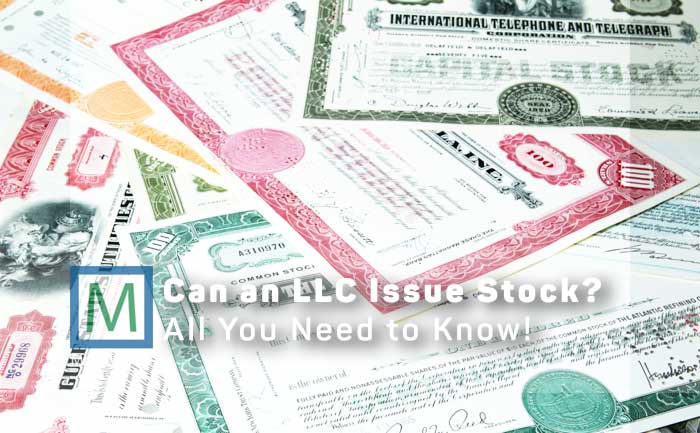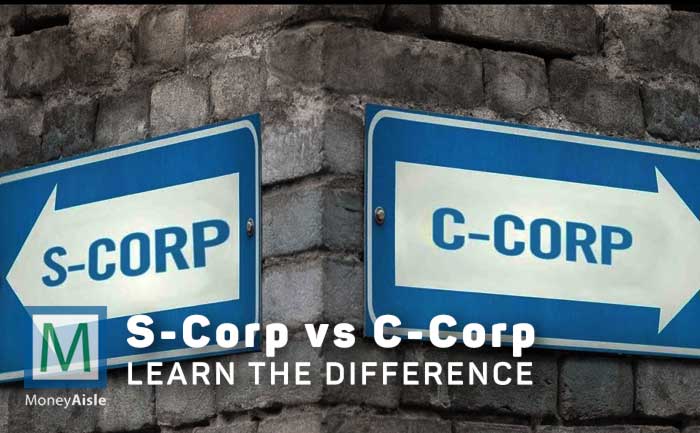Can a Limited Liability Company (LLC) issue stock? The straightforward answer is no. An LLC cannot issue stocks. However, an LLC can issue membership units that are somewhat similar to the stocks of a corporation.
What is an LLC?
An LLC is a hybrid business structure that combines the characteristics of a sole proprietorship and a corporation. Unlike the shareholders of a corporation, the LLC owners are called members and an LLC can be a single-member or multi-member LLC.
Over time, an LLC can acquire new members or a member can leave the LLC at any time as per LLC operating agreement. However, the acquisition of new owners is completely different from getting shareholders in S Corp or C Corp.
Many entrepreneurs and business owners wonder if an LLC cannot issue shares or stock, how an LLC gets new owners, or what if a member wants to leave the company. Let’s dig into the details of why an LLC cannot issue stock or shares and how ownership works in LLCs and corporations.
Important
If you want limited liability protection for your business but don’t know which entity structure is best for your business, read S Corp vs C Corp vs LLC vs LLP: Side-by-Side Comparison. You can follow our DIY Guides to Start an LLC or How to Form a Corporation in all states of the USA.
How Ownership Works in LLCs
A person can become a limited liability company (LLC) member through an operating agreement that outlines the capital contribution, profit or loss distribution, and day-to-day duties of LLC members. So, you cannot acquire LLC ownership by purchasing stocks from the open market.
The reason behind this is that an LLC cannot go public like a corporation. So there are no shares or equity ownership that can be bought and sold on the open market.
However, an LLC can sell units of interest on the stock exchange as a publicly traded LLC. Moreover, LLCs can also issue debt securities such as bonds, debentures, etc.
Read the complete article “Can an LLC Go Public? Publicly Traded LLCs Explained” to learn more about how an LLC can sell membership units in the open market.
An LLC is taxed as a pass-through entity where profits and losses are passed through directly to the owners. The company is not itself taxed as a separate entity and no stock is issued to the LLC members.
You can learn more about the characteristics of a Limited Liability Company in this article.
The LLC ownership represents units in a collective enterprise. It means that ownership is determined based on the percentage of total capital contributed – not by how many shares someone owns.
Therefore, each member can have different voting rights or other privileges in the decision-making of the company’s affairs.
How Ownership Works in Corporations
One of the main reasons companies decide to issue stock is to raise capital. In a corporation, the company is taxed as a separate entity from its owners. Hence, corporations are subjected to double taxation. Shares of the corporation’s stock represent residual claims to the profits of the corporation.
In a corporation, a part of the company is converted into equity shares and offered for sale on a public market or to private investors. The corporation issues these equity shares in return for capital from the investors. The firm uses this capital investment to fund its operations or growth opportunities.
The owners of these shares are called shareholders of the corporation. These shareholders receive dividends and can sell their shares to other buyers on a secondary market or in a private transaction.
In return for their investment, shareholders in a corporation are granted voting rights which allow shareholders to make decisions in the board of directors or management. Moreover, shareholders can participate in decisions related to corporate actions such as acquisitions, mergers, etc.
How LLC Membership Units and Corporation Stock are Similar?
LLC membership units are similar to stock in a few ways. Below we have listed how LLC membership units and corporation stock are alike:
- Both corporation stocks and LLC membership units divide up the company ownership amongst the owners,
- Both corporation stocks and LLC membership gives owners voting rights and decision-making power in the company,
- Both corporation stocks and LLC membership allow owners to have a share in the profits,
- Like different classes of corporation stock, LLC membership creates different classes of membership units (common stock vs preferred stock).
How LLC Membership Units and Corporation Stock are Different?
Due to the company structure, LLC membership units and corporation stocks are different somehow. Here is how corporation stocks and LLC membership units are different:
- LLC membership unit can not be sold like corporation stock in the open market unless the LLC chooses to be a publicly traded LLC,
- Unlike corporations, LLCs can express ownership on a percentage basis like a partnership.
Bottom Line
Whether you want to raise capital through the selling of stocks or LLC membership units, it depends on your business goals and the unique legal and financial considerations of your company. But whatever route you choose, it’s important to do your research and consult with an experienced lawyer to ensure that you’re making the right decision for your business.

Aisha Noreen is an owner of a small business with more than 9 years of experience in the marketing industry. With the wisdom of an old soul, she always seeks innovation and mind-blowing ROI techniques. Her unique approach helped many small businesses thrive and she can surprise you in many ways as well. Believe it or not, her energy, passion, and creativity are contagious enough to transform your business and take it to another level.








